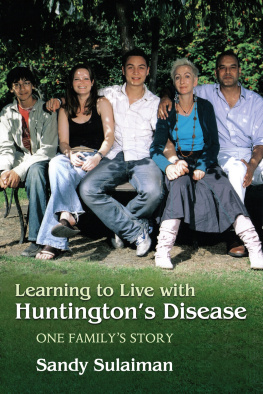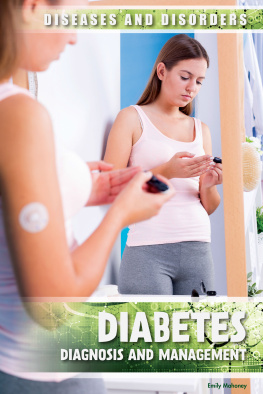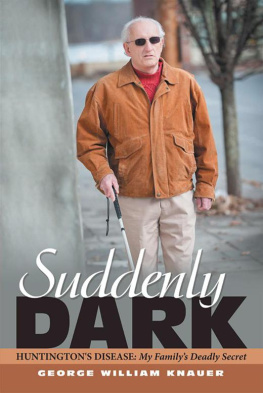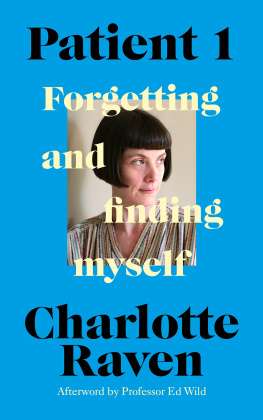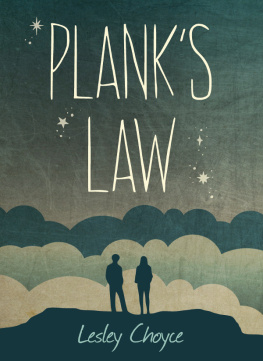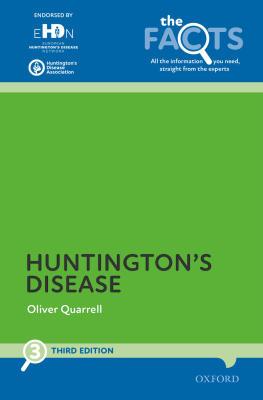
Learning To Live With Huntingtons Disease
of related interest
Alzheimer
A Journey Together
Federica Caracciolo
Foreword by Luisa Bartorelli
ISBN 978 1 84310 408 7
eISBN 978 1 84642 234 8
A Personal Guide to Living with Progressive Memory Loss
Sandy Burgener and Prudence Twigg
ISBN 978 1 84310 863 4
eISBN 978 1 84642 719 0
The Man who Lost his Language
A Case of Aphasia: Revised Edition
Sheila Hale
ISBN 978 1 84310 564 0
eISBN 978 1 84642 626 1
Stroke Survivor
A Personal Guide to Recovery
Andy McCann
Forewords by Robin Sieger and The Stroke Association
ISBN 978 1 84310 410 0
eISBN 978 1 84642 472 4
Dancing with Dementia
My Story of Living Positively with Dementia
Christine Bryden
ISBN 978 1 84310 332 5
eISBN 978 1 84642 095 5
Losing Clive to Younger Onset Dementia
One Familys Story
Helen Beaumont
ISBN 978 1 84310 480 3
eISBN 978 1 84642 862 3
Law, Rights and Disability
Edited by Jeremy Cooper
ISBN 978 1 85302 836 6
eISBN 978 1 84642 122 8
Telling Tales About Dementia
Experiences of Caring
Edited by Lucy Whitman
Foreword by Joanna Trollope
ISBN 978 1 84310 941 9
eISBN 978 0 85700 017 0
Quality of Life and Disability
An Approach for Community Practitioners
Ivan Brown and Roy I. Brown
Foreword by Ann Turnbull
ISBN 978 1 84310 005 8
eISBN 978 1 84642 404 5
Learning to Live with Huntingtons Disease
One Familys Story
Sandy Sulaiman

Jessica Kingsley Publishers
London and Philadelphia
First published in 2007
by Jessica Kingsley Publishers
73 Collier Street
London N1 9BE, UK
and
400 Market Street, Suite 400
Philadelphia, PA 19106, USA
www.jkp.com
Copyright Sandy Sulaiman 2007
All rights reserved. No part of this publication may be reproduced in any material form (including photocopying or storing it in any medium by electronic means and whether or not transiently or incidentally to some other use of this publication) without the written permission of the copyright owner except in accordance with the provisions of the Copyright, Designs and Patents Act 1988 or under the terms of a licence issued by the Copyright Licensing Agency Ltd, Saffron House, 610 Kirby Street, London EC1N 8TS. Applications for the copyright owners written permission to reproduce any part of this publication should be addressed to the publisher.
Warning: The doing of an unauthorised act in relation to a copyright work may result in both a civil claim for damages and criminal prosecution.
Library of Congress Cataloging in Publication Data
Sulaiman, Sandy, 1959
Learning to live with Huntingtons disease : one familys story / Sandy Sulaiman.
p. cm.
ISBN-13: 978-1-84310-487-2 (pb)
ISBN-10: 1-84310-487-3 (pb)
1. Sulaiman, Sandy, 1959---Health. 2. Huntingtons chorea--Biography. 3. Huntingtons chorea--Patients--Family relationships. I. Title.
RC394.H85S85 2007
616.8510092--dc22
[B]
2007006818
British Library Cataloguing in Publication Data
A CIP catalogue record for this book is available from the British Library
ISBN 978 1 84310 487 2
eISBN 978 1 84642 630 8
Thank-yous
Well, I dont want this to sound like Gwyneth Paltrows Oscar acceptance speech, where she collapsed in tears while thanking the world. But, there are a number of people I just have to mention because they keep us going. First and foremost...
Thank you to Joanna Davies,
my incredible friend
without whom this book would not exist
and my life would not be nearly as much fun.
Thank you also to:
All at Hightown Surgery who help keep us afloat, particularly Dr Cornwall, Dr Hin and Carol Blake who provide a constant source of insight, wisdom, strength, support and some rather useful medication.
Carol Dutton, our regional advisor for the UK Huntingtons Disease Association, who thinks for us, fights for us, argues on our behalf, stands up for us when we are too tired to represent ourselves, finds solutions when we have no ideas or resources of our own left, and generally champions our needs.
My mum, Maggie, who keeps us all going with her constant support, acts as unofficial chauffeur, takes a load off of Phil (everything from keeping Dan in ironed school clothes to Friday afternoon shopping), and keeps coming around to help even when I am snappy and rude to her (sorry about that, Maggie).
Phils mum, Pat, who lives almost a hundred miles away but regularly makes the journey up to see us, scrubs and irons everything in sight until it gleams and also stays over when Phil has to work away from home.
Caroline, Vicky, John and everyone else at Turpins Lodge Riding School. And, of course, Charlie, my other man (well, horse, but I tell Phil hes my other man).
My loving friends (you know who you are), especially Helen, Alan and the girls, Andy (Ben) Center, Angela and their girls.
All at the amazing Clive Project (www.thecliveproject.org.uk), who help me live the life I want to live, including Tessa, Nic, Gill and especially, of course, Jo. There are some rare, special people in the world who can light up the lives of those around them. Tess specializes in spotting them and recruits them to work for the Clive Project. Its a unique service and I dont know what Id do without them.
Introduction: The Most Cruel Disease Known to Man
Huntington disease (HD) is an inherited brain disorder that causes progressive deterioration of the physical, cognitive and emotional self. It leads to severe incapacitation and eventual death 10-40 years after the onset of the disease. Although it usually affects adults between the ages of 30 and 45, symptoms can appear in young children and older adults.
Common symptoms are uncontrollable movements, abnormal balance when walking, slurred speech, difficulty swallowing, thinking difficulties, and personality changes. Each child of an affected parent has a 50% chance of inheriting the HD gene, which is located on chromosome four. There is no cure and no effective treatment exists, but scientists are exploring possible treatments and caregivers are developing new approaches to care.
(Paulsen 1999, p.5)
When people ask us what Huntingtons Disease is we say something like Imagine the physical effects of Parkinsons Disease, mixed up with the mental deterioration of Alzheimers and youre in roughly the right territory. Its terminal, but it takes its time, decades sometimes. Oh, and its hereditary: each of your kids has a 50 per cent chance of inheriting it.
Weve heard Huntingtons Disease described as, variously, the gradual and relentless dismantling of a human being (ugh) and the most cruel disease known to man (double ugh).
Its described as cruel because it delivers not just a double whammy, or a triple whammy, but a relentless series of whammies that just keep on hitting a family over the course of years, of generations, in fact.
It just keeps on coming
Steel yourself. Theres:
a gradual mental decline, with depression common and pronounced mental illness including psychosis and delusions not uncommon; thought processes decline as the illness gradually kills your brain cells and the connections between them
an emotional decline, leading to sudden mood swings, a blunting of emotions, loss of ability to relate to people you love, frustration, outbursts of anger and aggression
Next page
